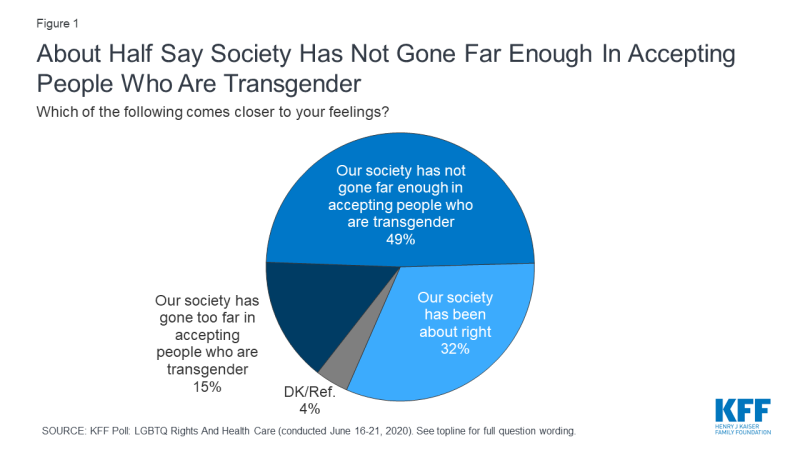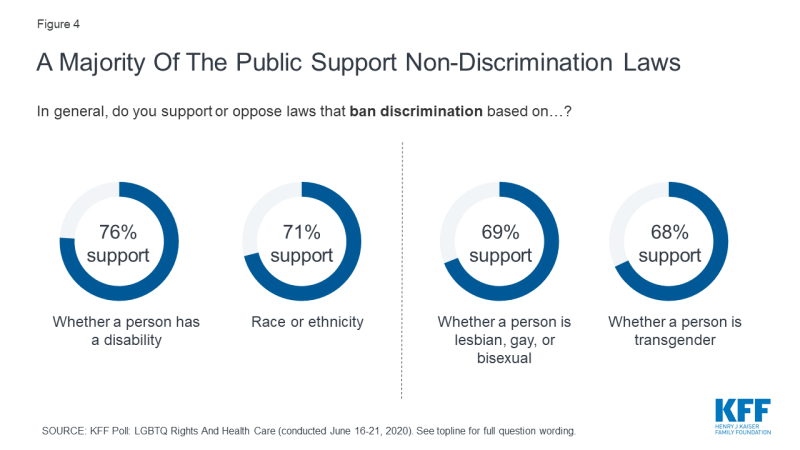Majorities Support Policies Banning Discrimination Against LGBTQ Individuals' Health Care Access
The Trump administration has taken several steps to roll back protections for LGBTQ people, including in health care. Most recently, on June 12th, the administration released a final rule on Section 1557 of the Affordable Care Act and other health regulations, removing protections based on sexual orientation and gender identity (including transgender status) in health care, arguing that the definition of sex does not extend to either. As a result of this rule, for example, health care insurers and providers could refuse to cover or treat someone who is transgender. Just three days later, however, the U.S. Supreme Court issued a landmark 6-3 decision, concluding that gender identity and sexual orientation are protected under the definition of sex discrimination in the workplace. While the Supreme Court decision pertains to employment and not health care, it likely has significant implications for the HHS rule. On June 22, 2020, a lawsuit was filed by several organizations using the Supreme Court decision to challenge the constitutionality of the Trump administration’s Section 1557 rule.
It is unclear if the Trump administration will move forward with the rule in light of the Supreme Court decision. If implemented, the rule would have significant implications for LGBTQ people, a population already facing challenges in accessing health care services. The latest KFF poll finds the rule is also at odds with public opinion. The poll, conducted among 1,001 U.S. adults immediately following the Supreme Court decision (June 16th–21st), finds a majority of the public supporting laws that ban discrimination based on whether a person is lesbian, gay, bisexual, or transgender and think it should be illegal for health care providers and health insurance companies to deny care for such individuals.
Partisans differ in whether society has gone too far or not far enough in accepting people who are transgender and in their views on how much discrimination LGBTQ individuals face. But majorities of Democrats, independents, and Republicans say they support laws banning discrimination based on whether a person is lesbian, gay, or bisexual (78%, 66%, and 62%) or transgender (77%, 63%, and 62%). In addition, more than eight in ten Democrats, independents, and Republicans say it should be illegal for doctors or other health care providers to refuse to treat people because they are lesbian, gay, bisexual, or transgender. Majorities (94% of Democrats, 84% of independents, and 73% of Republicans) also say it should be illegal for health insurance companies to refuse to pay for health care services for people who are transgender.
Half Say U.S. Hasn’t Gone Far Enough In Acceptance Of People who are Transgender
Half (49%) of U.S. adults say our society has “not gone far enough in accepting people who are transgender,” more than three times as many who say our society has “gone too far in accepting people who are transgender” (15%). About one-third (32%) say our society “has been about right” in accepting transgender individuals. This may mark a shift in attitudes in recent years with a larger share of individuals now saying society hasn’t gone far enough in accepting transgender people (up 10 percentage points from a 2017 Pew Research Center poll).
Attitudes about whether society has gone too far or not far enough in accepting people who are transgender are largely partisan, similar to where they were three years ago. Two-thirds of Democrats (65%) and half of independents say society has “not gone far enough”. One-fourth of Republicans (24%) agree while four in ten (42%) Republicans say society’s acceptance of transgender individuals “has been about right.” Three in ten Republicans say society has “gone too far” in its acceptance, compared to 14% of independents and 8% of Democrats.
While previous research has found generational differences in views towards transgender individuals, the latest KFF poll finds about half of adults – across all age groups – say society has “not gone far enough” in its acceptance of people who are transgender, as do six in ten people (60%) who say they personally know someone who is transgender (36% of total).
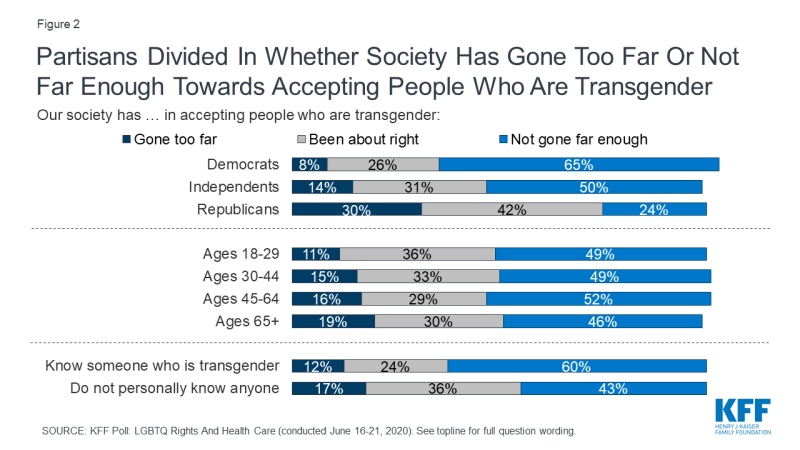
Figure 2: Partisans Divided In Whether Society Has Gone Too Far Or Not Far Enough Towards Accepting People Who Are Transgender
Do You Know Someone Who Is Transgender? Nearly Half Of 18–29 year olds Say They Do
More than one-third of U.S. adults (36%) say they personally know someone who is transgender. While substantial shares across racial groups (34% of white, non-Hispanic adults and 40% of non-white adults) and partisanship (29% of Republicans, 36% of Democrats, and 39% of independents) say they personally know someone, including themselves, who is transgender, there are large differences across age groups. Nearly half of 18-29 year olds (46%) and four in ten (41%) 30–44 year olds who say they know someone who is transgender compared to three in ten 45–64 year olds and 27% of adults 65 and older.
Majorities Say LGBTQ Individuals Face Discrimination
A majority of U.S. adults say transgender people (79%) and lesbian, gay, and bisexual people (74%) face at least some discrimination in the U.S. today. This is somewhat similar to the shares of the public who say there is at least some discrimination against Hispanic (77%) and Black people (84%) and considerably more than the share who say the same about white people (28%). Notably, nearly half (45%) of U.S. adults say there is “a lot” of discrimination against transgender individuals in society today, compared to 53% who say the same about Black individuals.
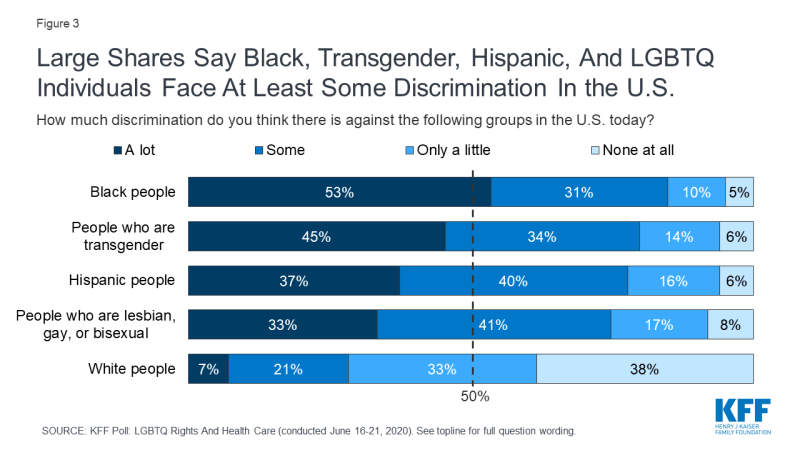
Figure 3: Large Shares Say Black, Transgender, Hispanic, And LGBTQ Individuals Face At Least Some Discrimination In the U.S.
A smaller share, but still a majority of Republicans, say there is at least some discrimination against Black people (72%), Hispanic people (59%), and people who are lesbian, gay, or bisexual (61%) or who are transgender (67%).
| Table 1. Smaller Shares Of Republicans Say There Is At Least Some Discrimination Against Certain Groups | |||
| Percent who say there is at least some discrimination against the following groups in the U.S. today: | Democrats | Independents | Republicans |
| Black people | 93% | 83% | 72% |
| People who are transgender | 87 | 79 | 67 |
| Hispanic people | 89 | 76 | 59 |
| People who are lesbian, gay, or bisexual | 85 | 72 | 61 |
| White people | 17 | 34 | 37 |
Majorities Support Policies banning discrimination Against LGBTQ Individuals
A majority of the public think LGBTQ individuals should be protected from discrimination and support laws protecting them at about the same rate as they support laws protecting people who are discriminated against because of their race or ethnicity or because they have a disability.
Nearly seven in ten individuals say they support laws that ban discrimination based on whether a person is lesbian, gay, or bisexual (69%) or transgender (68%). This is similar to the share who support laws that ban discrimination based on race or ethnicity (71%) and only slightly smaller than the share who support laws banning discrimination against people with a disability (76%).
Laws protecting LGBTQ individuals from discrimination are supported by a majority of Democrats, independents, and Republicans, with at least six in ten across partisan groups saying they support laws banning discrimination based on whether a person is lesbian, gay or bisexual (78%, 66%, and 62%, respectively) or transgender (77%, 63%, and 62%, respectively).
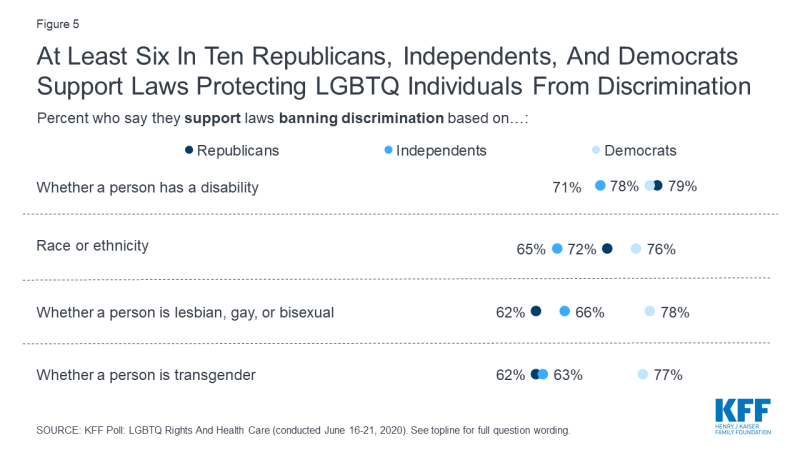
Figure 5: At Least Six In Ten Republicans, Independents, And Democrats Support Laws Protecting LGBTQ Individuals From Discrimination
Large Majorities Think It Should Be Illegal For Employers and Health Care Providers To Discriminate Against LGBTQ People
The vast majority of the public say it should be illegal for employers and health care providers to discriminate against people because they are lesbian, gay, bisexual or transgender. Nine in ten adults agree with last week’s Supreme Court ruling and say it should be illegal for employers to fire or refuse to hire people because they are lesbian, gay, or bisexual (90%) or transgender (89%). A large majority also say it should be illegal for doctors or other health care providers to refuse to treat people because they are lesbian, gay, or bisexual (89%) or transgender (88%). Eighty-five percent say it should be illegal for health insurance companies to refuse to pay for health care services for people who are transgender.
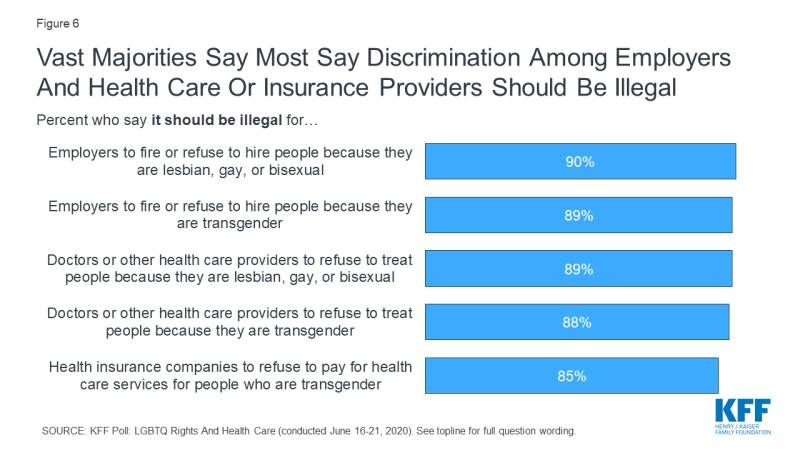
Figure 6: Vast Majorities Say Most Say Discrimination Among Employers And Health Care Or Insurance Providers Should Be Illegal
Majorities across partisanship say it should be illegal for employers, doctors and health care providers, and health insurance companies to be able to treat employees or patients differently because they are lesbian, gay, bisexual, or transgender.
| Table 2: Majorities Across Partisans Say Discrimination Against LGBTQ Individuals Should Be Illegal | |||
| Should it be legal or illegal for… | Democrats | Independents | Republicans |
| …employers to fire or refuse to hire people because they are lesbian, gay, or bisexual | |||
| Legal | 4% | 7% | 19% |
| Illegal | 96 | 91 | 78 |
| … employers to fire or refuse to hire people because they are transgender | |||
| Legal | 4 | 8 | 18 |
| Illegal | 96 | 90 | 77 |
| …doctors or other health care providers to refuse to treat people because they are lesbian, gay, or bisexual | |||
| Legal | 5 | 9 | 17 |
| Illegal | 94 | 89 | 81 |
| … doctors or other health care providers to refuse to treat people because they are transgender | |||
| Legal | 6 | 10 | 18 |
| Illegal | 94 | 88 | 79 |
| … health insurance companies to refuse to pay for health care services for people who are transgender | |||
| Legal | 5 | 13 | 24 |
| Illegal | 94 | 84 | 73 |
Despite the wide-reaching consequences of both of these actions, less than half of the public say they have heard at least some about either the recent Supreme Court ruling or the Trump administration rule. In fact, about one-third of U.S. adults say they have heard “nothing at all” about either the Supreme Court case prohibiting employment discrimination against LGBTQ individuals (32%) or the Trump administration actions removing protections for LGBTQ individuals when it comes to health care (35%).

Figure 7: Less Than Half Say They Have Heard At Least Some About Recent Trump Administration Actions Or Supreme Court Ruling
A smaller share of Republicans than Democrats say they have heard or read at least something about either the Supreme Court case (29% compared to 48%) or the Trump administration’s rule on LGBTQ access to health care (32% and 49%, respectively).

